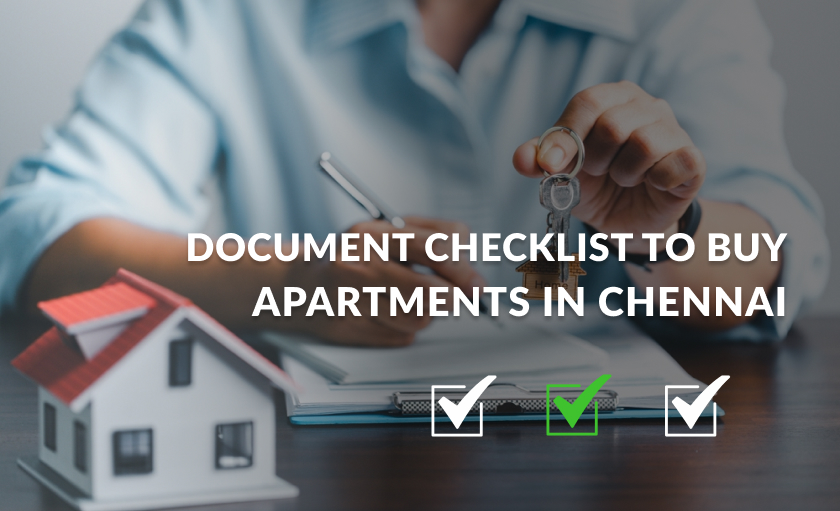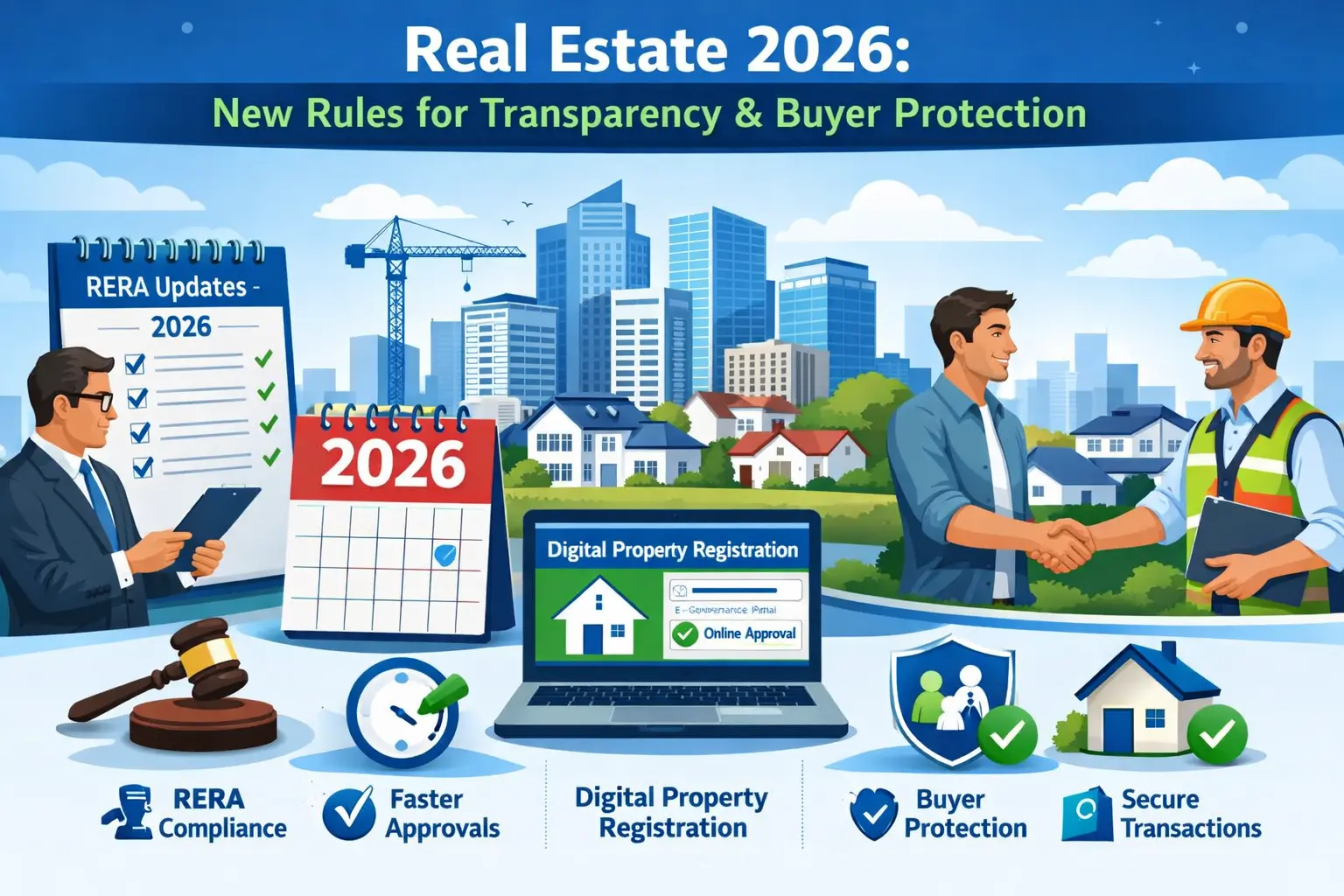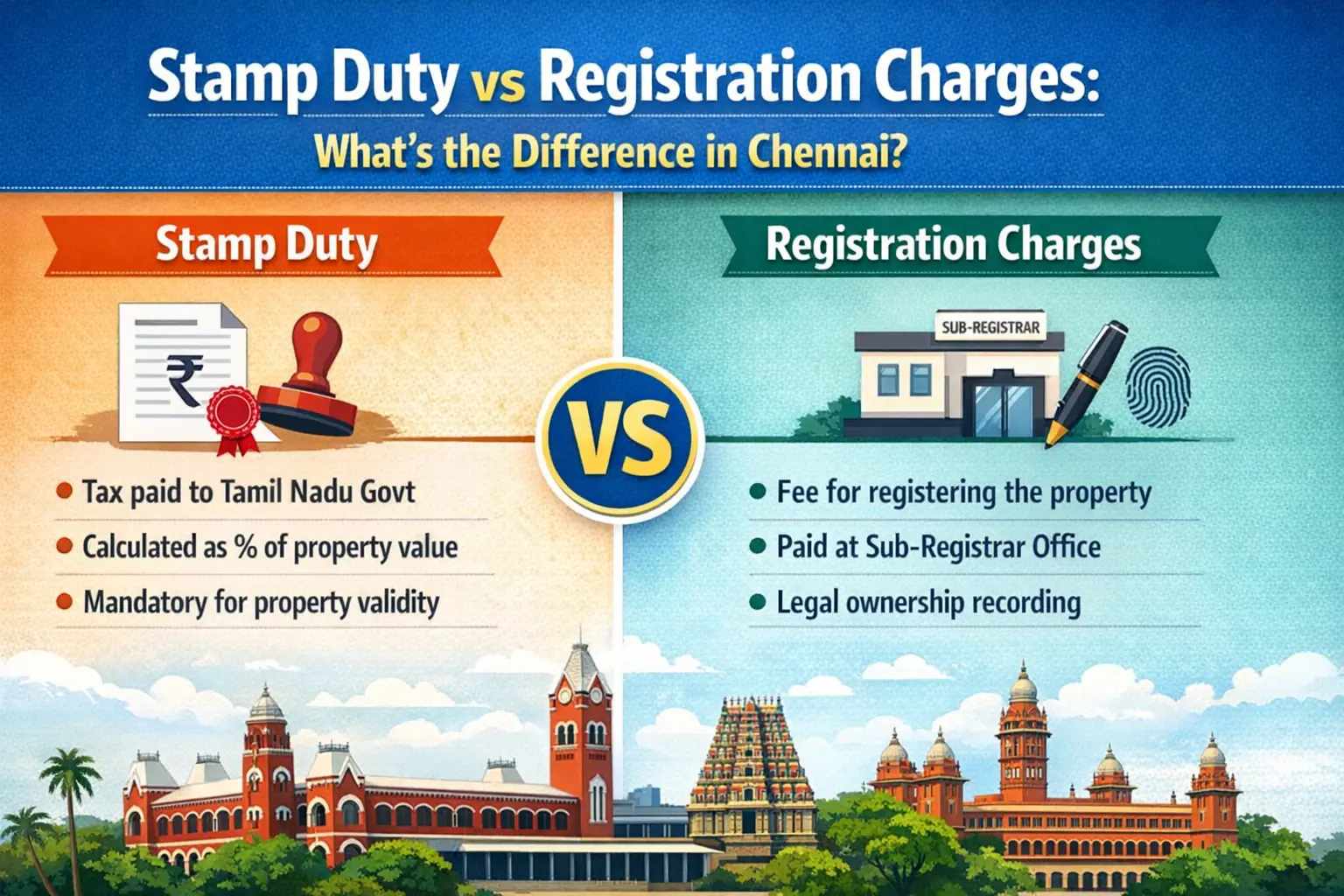When purchasing an apartment in Chennai, it’s crucial to verify and check various legal documents to ensure a smooth transaction and avoid potential issues in the future. Here's a detailed list of essential documents that you need to check and verify before buying an apartment in Chennai:
1. Title Deed
- What it is: The Title Deed is the primary legal document that proves the ownership of the property.--
- Why it’s important: It confirms the seller's right to sell the property. The buyer should ensure that the seller is the rightful owner and there are no disputes over ownership.
- What to check: Verify that the seller has a clear title, and check the chain of ownership for at least the past 30 years. Ensure that it’s not under any legal dispute or encumbrance.
2. Sale Deed
- What it is: A Sale Deed is a legal document executed between the buyer and seller, marking the transfer of ownership from the seller to the buyer.
- Why it’s important: It’s the key document for the property transfer.
- What to check: Ensure it contains accurate details of the property, including the agreed-upon price, the terms of the sale, and the buyer and seller's information. This deed must be registered with the Sub-Registrar Office.
3. Encumbrance Certificate (EC)
- What it is: The Encumbrance Certificate provides a record of all transactions related to a property, including any mortgage or loans.
- Why it’s important: It proves that the property is free of legal or financial encumbrances and that there are no outstanding loans against the property.
- What to check: Ensure that there is no mortgage or loan against the property. You can obtain this certificate from the local sub-registrar office. It is mandatory for getting a bank loan.
4. Occupancy Certificate (OC)
- What it is: The Occupancy Certificate is issued by the local municipal corporation or the development authority to confirm that the building complies with the approved plan and is ready for occupancy.
- Why it’s important: Without an OC, the building is considered illegal and not fit for habitation.
- What to check: Ensure that the OC is available and issued by the relevant municipal authority. It proves that the building has met all safety and construction standards.
5. Building Approval Plan
- What it is: The approved building plan is the design of the apartment complex or the building sanctioned by the local municipal authorities.
- Why it’s important: It verifies that the construction follows all the legal guidelines and zoning laws of the locality.
- What to check: Ensure that the builder has obtained approval from the local municipal authority or Chennai Metropolitan Development Authority (CMDA) before starting the construction.
6. Land Title Report
- What it is: A land title report is a detailed report that shows the ownership history of the land, including any disputes or claims over the property.
- Why it’s important: It ensures that the land title is clear, and there are no legal issues or claims against the property.
- What to check: Review the history of ownership for the land. If the land has been sold multiple times, investigate whether all previous owners had legal rights over it.
7. Property Tax Receipts
- What it is: Property tax receipts are official records from the local municipality indicating that the property taxes have been paid by the seller.
- Why it’s important: It ensures that there are no outstanding dues and the property is not at risk of being seized due to non-payment of taxes.
- What to check: Obtain the latest property tax receipts to confirm that the taxes have been paid up to date.
8. No Objection Certificate (NOC) from the Society or Builder
- What it is: If the property is located in a gated community or a building complex with a society, the builder or society must issue an NOC (No Objection Certificate).
- Why it’s important: The NOC ensures that the seller has no dues to the society or the builder and that the buyer can legally move into the property.
- What to check: Verify that there are no pending maintenance dues or other obligations that the buyer may inherit.
| "BEST BUILDER FLOOR APARTMENT" |
9. Sanctioned Layout Plan
- What it is: The sanctioned layout plan is an approved document that outlines how the property and its surrounding areas are planned.
- Why it’s important: It ensures that the construction is being done according to the approved designs and within legal boundaries.
- What to check: Verify that the layout plan has been approved by the appropriate authorities (e.g., CMDA in Chennai) and is available for review.
10. RERA Registration Number (For New Properties)
- What it is: The Real Estate (Regulation and Development) Act, 2016 (RERA) mandates that builders and developers register their projects with RERA before advertising or selling.
- Why it’s important: RERA registration ensures that the builder is compliant with real estate regulations and the buyer is protected under the Act.
- What to check: For new apartments, confirm that the builder has registered the project with RERA and check the RERA registration number on the official RERA website.
11. Sale Agreement (For Under-construction Properties)
- What it is: A Sale Agreement is a document that details the terms and conditions of the sale of an under-construction property.
- Why it’s important: It sets the expectations and responsibilities of both the buyer and the builder during the construction phase.
- What to check: Ensure that the agreement specifies the construction timeline, payment schedules, and possession date. Also, check for any clauses related to delayed possession.
12. Bank Loan Clearance Documents (If Applicable)
- What it is: If the seller had a mortgage on the property, they must provide a clearance letter from the bank stating that the loan has been repaid.
- Why it’s important: This document confirms that the property is free from any pending financial liabilities.
- What to check: Ensure that the seller has cleared any outstanding loans on the property before transferring ownership.
13. FIR/Police Verification Certificate (For Foreign Nationals)
- What it is: If the seller is a foreign national, they may require police verification to confirm that they are legally permitted to sell property in India.
- Why it’s important: Foreign nationals face restrictions when owning property in India, so verification is necessary.
- What to check: Ensure that the foreign seller has complied with Indian laws regarding property ownership.
14. Sale and Purchase Agreement (For Resale Properties)
- What it is: This is an agreement between the buyer and the seller of a resale property that outlines the terms of the sale.
- Why it’s important: It formalizes the transaction and serves as proof of the agreed-upon terms.
- What to check: Ensure that all details regarding the price, payment schedule, and transfer of possession are clearly mentioned.
15. Builder’s PAN Card
- What it is: The builder’s PAN card is an identification document for the builder or developer.
- Why it’s important: It helps verify the authenticity and legitimacy of the builder.
- What to check: Ensure that the builder is registered and has provided a valid PAN card before proceeding with any transaction.
16. Completion Certificate
- What it is: The Completion Certificate is issued by the builder or developer confirming that the construction work has been completed as per the approved plans.
- Why it’s important: It certifies that the building is ready for possession and complies with local building regulations.
- What to check: Verify that the completion certificate is issued, confirming that the apartment is ready to be occupied.
17. Share Certificate (For Co-operative Societies)
- What it is: A Share Certificate is a document issued by a cooperative housing society to confirm the buyer's membership in the society.
- Why it’s important: It establishes ownership of a flat in the society and the buyer’s rights to the property.
- What to check: Ensure the share certificate is transferred in the buyer’s name upon purchase.
18. Form 37-I (For Agricultural Land Conversion)
- What it is: This form is required if the property you’re purchasing was originally agricultural land and has been converted into residential land.
- Why it’s important: It ensures that the conversion of land use from agricultural to residential is legal.
- What to check: Make sure that the property has been converted according to local zoning laws.
Also read: Best Place To Buy Builder Floor Apartment In Chennai
https://www.livehomes.in/blogs













